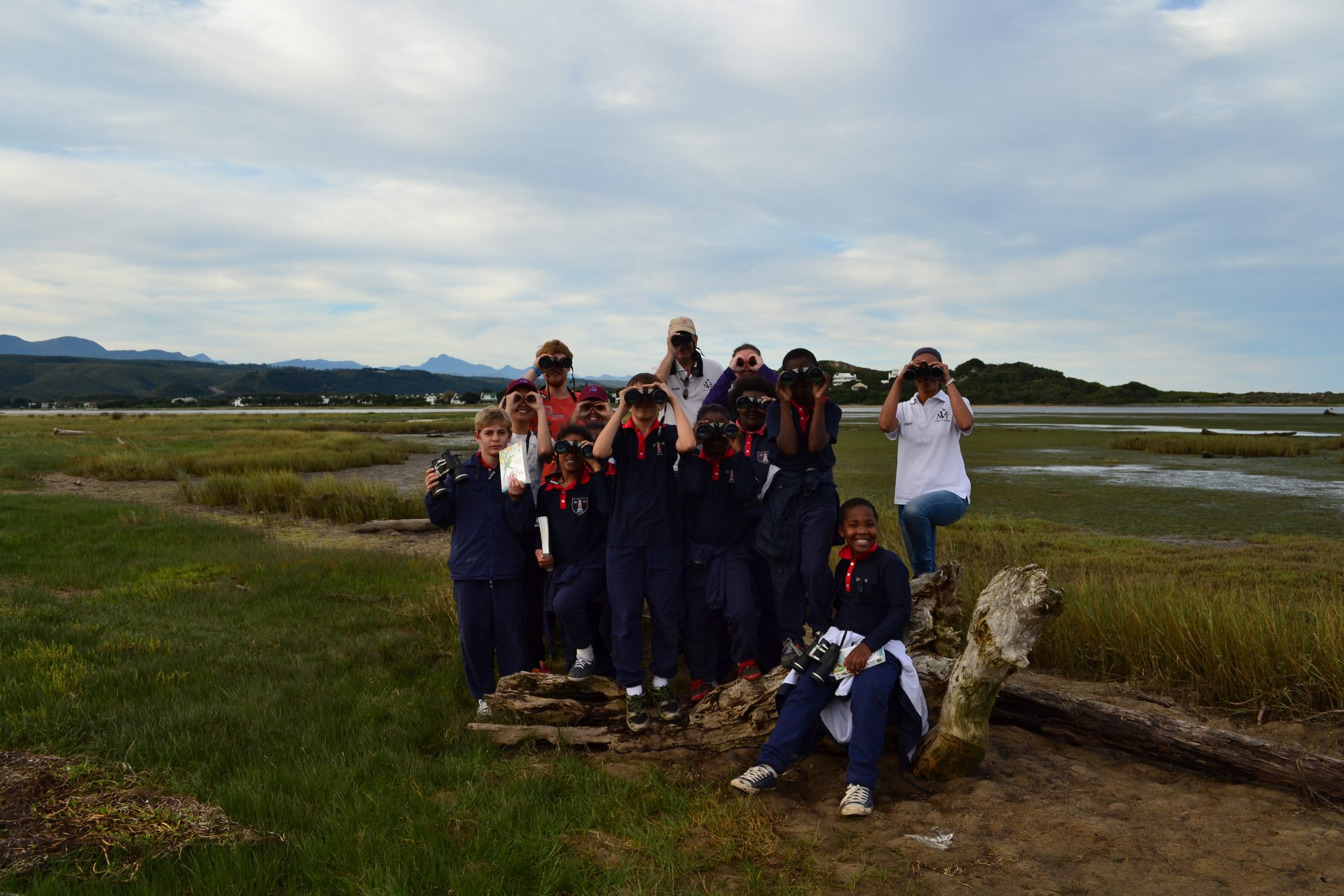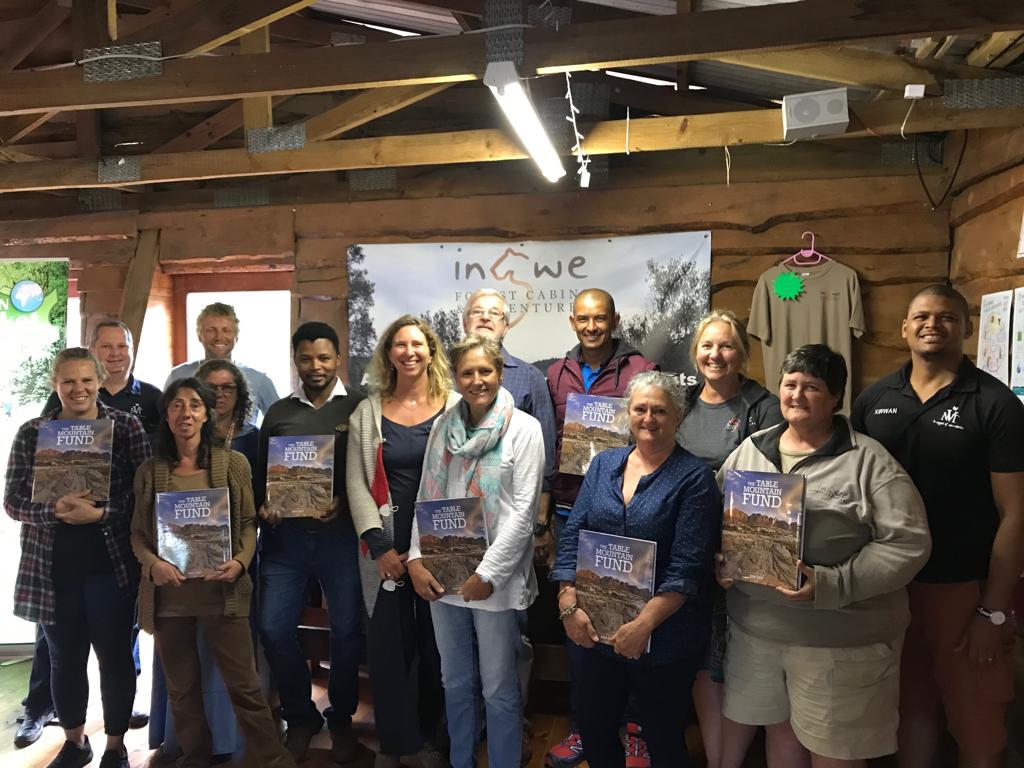Conservation Education
Photo credit: Theresa van Staden
Environmental education is a vital field that seeks to cultivate knowledge, awareness, and action towards the protection and conservation of the natural world. Equipping individuals with the knowledge and skills to make informed decisions, encouraging responsible and sustainable use of natural resources. With increasing concerns about environmental degradation and climate change, environmental education plays a crucial role in empowering individuals with the understanding and skills needed to address these challenges. NVT’s conservation education programme is a noteworthy initiative that aims to inspire and engage communities in the Bitou area and southern Africa. Through various educational activities, hands-on experiences, and community partnerships, the programme strives to foster a deeper appreciation for nature, promote sustainable practices, and empower individuals to become active stewards of the environment. By nurturing a sense of connection, knowledge, and responsibility, this NVT programme exemplifies the transformative power of environmental education in creating a more sustainable and resilient future.
NVT uses curriculum-based initiatives to reach a great number of members of the public and invest in both the current and the next generation, equipping them to understand why conservation should be an integral part of how they live their lives.
NVT also runs programmes around national and international environment themes, such as national water week, world environment week, national arbour week, marine week, etc. NVT works closely with many schools, where we run WESSA eco-clubs linked to the internationally acclaimed WESSA Eco-Schools programme. Also included in the programme are two annual projects which teach children about the marine environment and how to assess the health of the rivers that they use on a daily basis.
NVT has implemented various environmental education projects to promote awareness, knowledge, and a deeper connection to nature. Below you will find some more details of the different arrows in our Conservation Education quiver.
Through these environmental education projects, we aim to nurture a sense of environmental stewardship, inspire action, and build a community that values and protects the natural heritage of the region. By engaging individuals of all ages and backgrounds, these initiatives create opportunities for learning, personal growth, and collective efforts toward a more sustainable future.
Adopt-a-Beach project
NVT’s Adopt-a-Beach project is a significant initiative focused on the conservation and protection of South African marine and coastal environments. This project engages local school learners in the monitoring and stewardship of their local beaches, fostering a sense of responsibility and ownership among participants.
The Adopt-a-Beach project was initiated by the CoastCare Programme run by Marine & Coastal Management and WESSA (Wildlife and Environment Society of South Africa). This project aims to educate learners on how to enjoy and share the rich variety and benefits our coastline has to offer responsibly. As an extension of the subject matter covered in the Grade 7 CAPS curriculum, seven lessons are developed in conjunction with teachers from local participating schools.
These lessons emphasise the need to take ownership of the coast and the management thereof to ensure current and future generations continued enjoyment thereof. The Adopt-a-Beach project involves taking learners on outings and asking them to complete a worksheet and practical activities for inclusion in their Adopt-a-Beach portfolio at the end of the year.
The Adopt a Beach project plays a vital role in marine and coastal conservation and environmental education in southern Africa. By engaging school learners and communities, raising awareness, promoting sustainable practices, and restoring coastal ecosystems, the project contributes to the preservation of marine biodiversity and the well-being of coastal communities. It provides valuable opportunities for environmental education, fosters community empowerment, and instils a sense of responsibility for the protection of South Africa’s marine and coastal environments.

Adopt-a-River project
NVT’s Adopt-a-River project is an initiative aimed at engaging local communities in the monitoring and conservation of rivers in the Nature’s Valley area. The project encourages community members and school groups to “adopt” a section of a river close to them and regularly monitor its health and water quality using the miniSASS citizen science tool.
During the school year, the project entails a number of lessons on how river systems work and the importance of keeping them clean. The adopt-a-river project highlights the importance of river and water management, focusing on the Bitou municipal area. Using the school’s version of the South African Scoring System (SASS5) for measuring river health, learners monitor the health of four river systems around Plettenberg Bay.
MiniSASS (South African Scoring System) is a simple and effective citizen science tool used to assess the ecological health of rivers. The MiniSASS tool requires the kids to look at macro-invertebrates in the river system, which are small organisms such as insects and crustaceans that inhabit freshwater ecosystems, to derive a SASS score. A SASS score indicates the health of the river system and the quality of the water, giving an indication of possible disturbances of and/or modifications to the river system. On the other hand, a SASS score can also indicate a healthy, undeterred river system due to the presence or absence of certain macroinvertebrate in the river.
The value of miniSASS as a citizen science tool within the Adopt a River project provides a powerful platform for community engagement, environmental awareness, data collection, and advocacy for river conservation. By actively involving community members in monitoring and protecting their local rivers, the initiative empowers individuals and fosters a sense of responsibility, ultimately contributing to the long-term health and sustainability of these valuable freshwater ecosystems.

Birding Connect project
This incredible junior birding project demonstrates transgenerational learning across different cultures within our diverse society. The Birding Connect project aims to instil global citizenry in the learners attending local Plettenberg Bay schools. It is run as a partnership between NVT and BirdLife Plettenberg Bay and is centred around experiential learning through birding outings.
The NVT project has stemmed from the school curriculum to engage learners on topics of ecology, habitat types, and species diversity. Encouraging not only a growing interest in birds and birding but also curiosity and questioning.
The eco-clubs participating identify eight to ten learners from the club who are enthusiastic about birds to join the project for the year, where they will be introduced to the basics of birding and how to identify birds and their habitats. The project also introduced the element of technology such as photography to open a new avenue of learning, growth, and opportunity for the learners.
The second phase of the project introduces learners to local birding areas within the Bitou area, such as Two Horse Dam and Goose Marsh. The learners gain experience in teamwork, use of field guides and photography. These outings help learners to understand their surrounding environment while fostering an enjoyment of birding.
Junior birding clubs hold significant value as they provide unique opportunities for young bird enthusiasts to engage with nature, learn about avian species, and contribute to bird conservation efforts. NVT’s Birding Connect project develops bird identification skills, raises environmental awareness, fosters conservation values, engages in citizen science, promotes outdoor exploration, nurtures personal growth, and fosters a sense of community among young participants. By providing these opportunities, the project cultivates a new generation of bird enthusiasts and conservationists who will contribute to the understanding, appreciation, and conservation of birds and their habitats.

WESSA Eco-Schools
The WESSA Eco-Schools programme is a globally recognized environmental education initiative that aims to empower schools to become sustainable and environmentally conscious institutions. WESSA, which stands for the Wildlife and Environment Society of South Africa, has adapted the international Eco-Schools framework to suit the South African context.
NVT facilitated the establishment of an Eco-Schools node in the Tsitsikamma area. Through this project, participating schools undertake an environmental audit in order to identify issues and adopt projects which are then linked and incorporated into the curriculum. A portfolio is then submitted to the national body each year to qualify for different certification levels.
NVT collaborates with local schools in the Bitou area to implement the WESSA Eco-Schools programme, an internationally recognized framework for sustainable development education. This initiative empowers students and educators to make environmentally friendly choices, improve the school’s ecological footprint, and engage in conservation projects within the school grounds and the broader community. By encouraging schools to adopt sustainable practices, the programme fosters a culture of environmental responsibility among students.
Being involved in the WESSA Eco-Schools programme offers numerous benefits and opportunities for schools and students. It fosters holistic sustainability, provides environmental education, encourages hands-on learning, promotes whole-school involvement, offers global recognition, and creates a positive impact on the environment and society. By participating in this initiative, schools play a vital role in shaping environmentally responsible citizens and contribute to building a sustainable future for all.
Calendar Days
Environmental calendar day events refer to specific days or dates that are dedicated to raising awareness and generating action around important environmental and conservation issues. These events are designed to highlight specific environmental challenges, celebrate nature, and inspire individuals and communities to take positive actions towards conservation. Some examples of environmental calendar day events include World Environment Day, Earth Day, World Water Day, and World Wildlife Day.
NVT, working with other local Bitou and Provincial partners, organises several big calendar events each year, depending on available funding. These days are themed around the National Environmental Calendar events, linked into the school curriculum, and get entire grades out into the field to learn hands-on about relevant conservation issues. Environmental calendar days play a vital role in creating awareness, educating the public, inspiring action, influencing policy, engaging communities, and fostering global solidarity around conservation issues. By highlighting specific environmental concerns and encouraging individuals to make positive changes, these events contribute to the overall goal of preserving and protecting our planet for future generations.
Outdoor Classrooms
Outdoor learning holds immense value as it provides a unique and enriching educational experience for students.
NVT has over the years established 17 outdoor classrooms in Nature’s Valley, each one focusing on a different environment, namely; marine, fynbos, forests, rivers, wetlands, botanical garden, a culturally significant shell midden site, alien vegetation, climate change, rocky shores, astronomy geology, dunes, food webs, land pollution and deforestation. Trail routes for children with interpretive information booklets and signage have been established in these ‘classrooms’. An Environmental Education Manual has also been developed to accompany the outdoor classrooms and to illustrate how NVT has incorporated all the learning areas of the school curriculum into their programme with specific learning outcomes and sample lesson plans.
The classrooms have proved to be successful and were utilized in SANParks’ ‘Kids in Parks’ programme in 2006, 2009, 2011 and 2013 (over 2000 children were included in this programme alone!) and are used by school groups visiting the area and the Tsitsikamma section of the Garden Route National Park.
The NVT outdoor classes offer several benefits that contribute to the overall development and well-being of learners by connecting students with nature, promoting experiential learning, enhancing health and well-being, fostering environmental stewardship, facilitating interdisciplinary learning, and nurturing a sense of place and community. By embracing outdoor education, learners gain a broader perspective of the world, develop a love for nature, and become empowered to make positive contributions to environmental conservation.
Bitou Environmental Education Forum
NVT formed, launched and established the Bitou Environmental Education Forum in 2011. This Forum was established to strengthen collaborations between different organisations, promote sharing of resources and locations, expertise and knowledge and in the end produce successful coordinated approaches to schools for environmental education. One of the Forum’s main objects is to create informed communities, increasing their knowledge of the environment, how to protect it and the benefits that accrue to them. NVT is proud to have been the driving force, and leader of the Bitou EE Forum since its inception. The forum now boasts over 20 partner organisations, all working together.
TMF Small Grants Node
- Reduce waste to landfill through community-based recycling or awareness initiatives.
- Improve home-based community food generation through community-based food security initiatives, establishing groups that grow and market high-quality organic vegetables.
- Development of community eco-venture enterprises, specifically around hiking, trail-running and mountain biking, especially in coastal areas.
- Alleviating high levels of dog breeding and associated animal welfare (and ecological issues) through dog sterilisation and education programmes in local communities.
- Improved management of local coastal and marine biodiversity through revision, education and enforcement of key municipal by-laws that are causing issues with the public.
- FarSight Farm: The study and practice of regenerative agriculture
- Peter Rae: Wittedrift Way Birding Festival
- Eco Atlas: Waste Minimisation within Bitou Municipality
- Lunchbox Theatre: The What a Waste educational theatre show
- South African Youth Expeditions: Development of Community Eco-venture Enterprises
- Ingwe: School Garden Education
- Muddy Pooches: Animal Sterilisation and pet education project
- Covie Community: Covie animal sterilisation
- Keep Plett Clean: Keep Plett Clean – 5R Programme
- Sunshine Animal Rescue: Kurland Village Dog & Cat Sterilisation Drive

